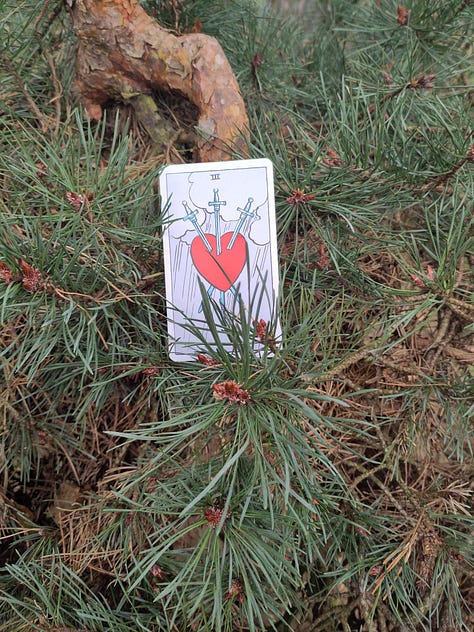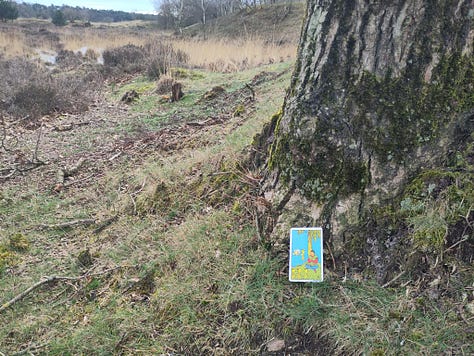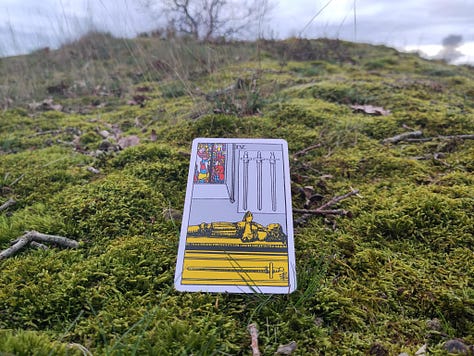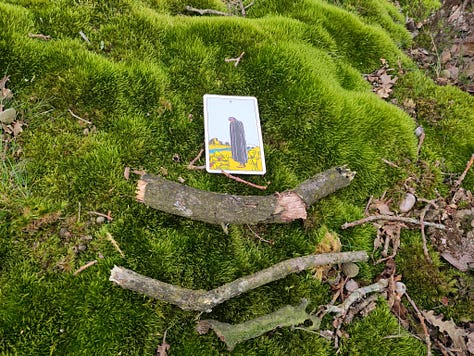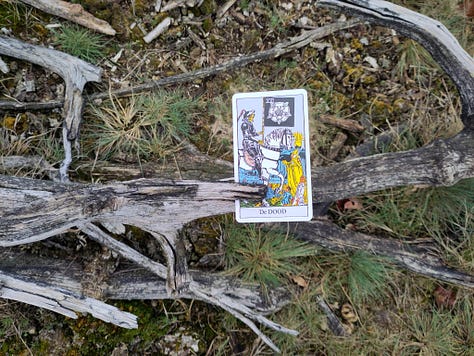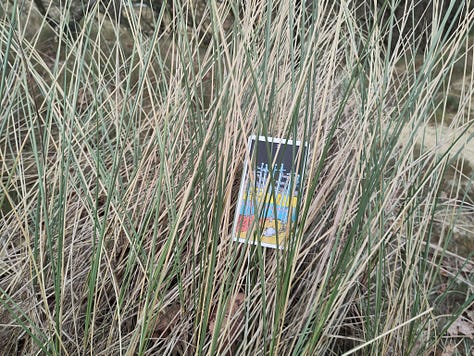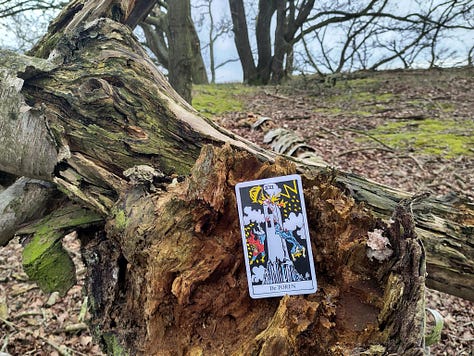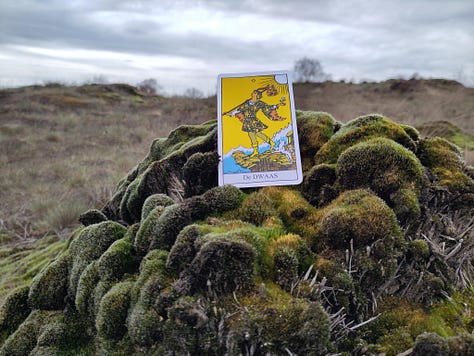Grief and Sadness : The flip side of Love
As the prelude to your future self. Letter from Rilke's "Letters to a young poet".
This is an essay on this pure wonder of letter from R.M Rilke sending this rocket back in back to hit me earlier on this year.
While this is a letter in response to a young poet sharing his struggles as a young poet, this response back from the master is astonishing by it’s wisdom, insights, clarity, optimism and a call to courage to be human.
The full text is read by me, and you will find my analysis further down below.
In the original text , Rilke calls his recipient Mr. Kappus. But of course, in a way we are all Mr.Kappus; his struggles are universal. I took it as if it was Rilke’s wise spirit, simply soothing us. It ended up being very cathartic to me as, it felt like my higher self was talking back to me from a timeless place and felt thunderstruck. So, I took the liberty to replace the original name to a more personal dear friend instead.
An English version of the original text can be found here.
Can we dare to be brave while a relentless transformation unfolds slowly but steadily in our beings? And what if instead of needing a crowd of people to help us get there, this would be so unique and profound that like giving birth, or dying, this is the type of dramatic transformation that it needs to happen quietly and in a solitary fashion?
Our world is full or concrete solutions to help us ease into the new chapters of our life through some sort of collective ritual. Like a first communion to celebrate the importance of reverence to the sacred to the young adult. Or the first encounter with alcohol and drugs with friends at a party as you enter into adolescence. Or some sort of rite of passage while entering young adulthood, getting married, etc. Humans have understood that sometimes the inner demons of doubt, fear, anxiety living within us can be cast away if the setting is full of symbols and encouragement from the group.
But what if at certain times, the jump from one reality to another should be addressed not in one go within a group of loved ones, but instead alone, and quietly and over an extended period of time? And what if the answers to our deepest fears where not to be found outside of us, but deep within ourselves? And what is the demons we are hunting for exorcism where precisely the heralds of the deepest lessons of life ?
This is exactly what Rainer M. Rilke offers as bold proposal to address and embrace our dark nights of the soul. In this letter to his young poet, admirer and friend, he is with humility counseling on the necessity for us to confront, understand, befriend and integrate what is slowly but surely unfolding in our soul and flesh. That this is the most courageous act one can take, because it’s acquainted to be truly alive during that process. That in order to listen to those new paradigms, one must default to be in solitude, as the distractions of the modern life delay the process indefinitely and prolong the existential sufferings and add extra noise in between our intuition and the outer layers of our being. And that the transformations that are happening are of a mysterious and magical nature that set us in a path of wisdom and wonder.
Rilke starts framing his help saying how futile everything he is about to say will ultimately be writing.:
“I can say almost nothing that is of any help, hardly anything useful.”
Not out of false modestly, but rather because he knows deeply that words are vastly inefficient compared to the reality of going through grief. He knows that the best descriptions will ultimately fall short of anything giving any clarity on the process. Precisely because the answers, no matter how simple, must come from within. However, as he is a poet, he also knows that the right words can echo in the right places within the soul and haunt, ruminate, and work through the body and help at the right time to tip things off and accelerate the birth of a new being, much like a midwife. A part of me feels suspicious though, because this statement leads me to a false sense that n
He continues by re-framing the experience not as a sadness that was not just passing by, but passing through. And from there the text becomes utterly spooky to me. This simple preposition changes everything, as one can now feel how the sadness may well have be in fact very much ghost-like. That preposition is so precise that we as a ready step for a short moment into horror. The same way while on a holiday trip to a distant country, we encounter out of a blue a fortune teller or psychic mind reader that reveals intimate details about our life and personal existential struggles. The through preposition, is so spot on, that we all revisit our most recent heartbreaks, disillusions, and grieving moments and we are now mesmerized and start pondering the ramifications of this re-framing of our life through this shift in perspective. Suddenly, the new perspective helps revisit our story with fresh senses. Now Rilke has our attention. He goes to provide further evidence and explains that:
“because we are in the middle of a transition where we cannot stand still. And that is why sadness passes: What is new in us[…] has entered into our hearts […] it is already in our blood”
As our bodies do not use words to express their wisdom, this sadness may reveal itself in different manners around our physiology. Tensions, blockages, unease, melt downs,etc. The logistical survivor warrior in us help us carry on during day light and for a while those are often repressed. And of course they tend to be therefore louder at night or when things get quiet. Rilke suggests therefore :
it so important to be solitary and attentive when one is sad. Because the apparently uneventful and static moment when our future comes upon us is so much close to life than that other noisy and accidental point when it happens to us as if from the outside. The quieter, the more patient and open we are in our sadness, the deeper and more unerringly the new will penetrate into us, the better we shall acquire it, the more it will be our fate, and when one day in the future it ‘takes place’ we shall feel related and close to it in our inmost heats. And that is necessary.
If sadness is a feeling that has remained through thousands, if not millions of years of evolution in mammals, it has be an significant pillar to our survival. Sadness is the painful realization that what we thought was true no longer is. Our associations between, people, places and things that have been so deeply wired have to readjust. I would speculate that that process of neuro-plasticity is so close to our identity all over our body that the rewiring is heavy and exhausting to the body in general that a period of grief is necessary, and we must stop, acknowledge its importance and even seek support. One theory suggests even that sadness may be a tool that helps humans to support each other and reaffirm what is important for them. The sad facial expression triggers mirror neurons in the other members of the tribe. Oxytocin flows and they suddenly feel more connected and more human. Ritual ought to emerge to remind themselves of what has “died” and what “does not die”.
Sadness is therefore deeply connected to Beauty as it is rare and does not last. And therefore it serves as a rite of passage to all of us that nothing lasts, and that “All things must pass”. And therefore, it is there to lead us to maturity, and teaching us how we should prepare ourselves to not cling too much to what we value the most, as it can be taken away at any moment. And therefore, sadness and death is the flip side of joy and a celebration of life ironically through gratitude. Think of it this way: How can you celebrate how important is the thing you do: The thing that you love the most, with the people you love, in the place you love. Because when you are in the middle of it, you are in a timeless space, in the present where you do not think of not doing it. You are literally lost in the moment doing it, experiencing it. And therefore, it is often when we feel that those things are so good that you a sudden bitter-sweetness arises. We are in the NOW still, but little melancholy creeps in.
We feel the love for the thing we love, and this melancholy reminds us that this is important to us and we should investigate WHY is it so important to us and WHAT does it say about ourselves and what we stand for in this life. It is an embodied experience, and it is so crucial that the body will not stop bringing this up again and again until we are connected with this feeling and its wisdom. The message is sub semantic, and it’s important that we do nonetheless the effort to put words into it, or sublimate it through something tangible like art and finally get that alignment.
Sadness is also connected to Truth. Until our neuro-pathways adapt to this embodied wisdom that “nothing lasts for ever”, “why the thing we do says something important about us”, and “why it gives us meaning”, we will be living in a limited, to some extend foolish and vulnerable to more suffering when we receive the reality check. Before being sad, we might have decided to deny such reality. Because who wants to be a kill joy. Why spoil the party with negativity?
The true measure of ones wisdom is the ability to appreciate how grateful you can feel enough times about that thing or person your care about without the drama. Feel the joy and the sadness at the same time. One way to put it is that Sadness is our bodies understanding that it’s OVER, but that “we” have not. And until that wiring gets aligned, we will not be aligned and will be stuck in an old frame that makes things painful.
The narrative may sound like: “ I can only be happy with this person and no-one else will make me as happy” Or “I had a the dream job at this company and now that I am fired, I will never find a better job.” Or “It was such a promising athlete and now that I have lost my legs, what am I?”. Until we heal those wounds and find that what we loved was not necessary the person we lost but what they made us feel and how important that is to us, we will not be willing to explore the possibility to have that same experience with someone else and are cutting ourselves to the mystery.
Until we realize that perhaps what we thought we loved the most was specific roles in our previous company could be expressed somewhere else, even starting a new carrier, we will be rejecting the possibility to live to deeper version of ourselves somewhere else. Until we realize that we can still be an athlete even without our valued limbs, through our ability to practice movement with other parts of our body and with a growth mindset, we will squandering the opportunity to have a deeper relationship with “movement” as a manifestation of the mystery. Rilke says:
For it is lethargy alone which causes human relationships to repeat themselves in the same old way with such unspeakable monotony…it is the fearful shying away from any kind of new unforeseeable experience which we think we many not be equal to.
But only someone who is ready for anything and rules nothing out, not even the most enigmatic things, will experience the relationship with another as a living thing and will himself live his own existence to the full.
To be able to come out of the sadness and feel the joy as we deeply understand that the thing we thought we had lost, is definitely still with us. When the alignment rises, we would feel no regrets. On the contrary, gratitude would fill us up and with tears in our eyes we feel the joy for being alive. Nietzsche says with his “Eternal return” parabol, we would be so grateful that we would be willing to go through that same painful experience again and again as we recognize it as a rite of passage that reveals to us who we really are and why we are alive. When we recognize that loving one thing for what it does to us or gives us in return is not real love. That would be called a transaction.
The real expression of love is of course unconditional.
A kind of: I love you, even if you do not love me back or cannot love me back”. Being able to say: “I love you just by witnessing you and being near you. And even if our path divert tomorrow and we where never to be seeing each other again, you are not dead in my heart. In fact, I can go deep in my heart and find you anytime. So I am not afraid and I am happy that you exist. And yet, I do not wish to see you go. You are forever in my heart.”
It takes some courage to reach this level of awareness. Maturity, wisdom and humility can only be embodied after a real encounter with our limits and those being in alignment with objective truth. Our minds are limitless, and we need that mindset for exploration. But we are also determined by our bodies that produce dopamine as we are making progress. It help us to keep going. But once we hit a wall, our bodies remind us that it’s time for a wake up and a reality check. And sadness is there to cure us from unrealistic expectations. Rilke adds:
If there is something in the way you go about things, then remember that sickness is the means by which an organism rids itself of something foreign to it. All one has to do is help it to be ill, to have its whole illness and let it break out, for that is how it mends itself… You must be patient as an invalid and trusting as a convalescent, for your are perhaps both. And more than that: you are also the doctor responsible for looking after himself. But with all illnesses there are many days when the doctor can do nothing but wait. And inasfar are you are your own doctor, this above all is what you must do now.
Moving on to the last part, one must bow to how Rilke recommends :
Do not watch yourself too closely. Do not draw over rapid conclusions from what is happening to you. Simply let it happen. […]The extraordinary circumstances of a solitary and helpless childhood are so difficult, so complicated, exposed to so many influences and at the same time removed from any real life-context, that is a vice enters into it we must not be too quick to call it a vice.
I find this passage so full of wisdom, as he understands that guilt and judgements are the defaults in most people. At at time where Freud psychotherapy was barely emerging, he was already cautioning on the limits of endless counter productive ruminations. That simple injunction to ‘let it happen’, feels so daoist and modern at the same time. He asks us to trust the process and the wisdom of the body and the mystery at play. He urges us to love that same process and reminds us to love our selves, which is also at the core of the Gospel.
What is great is that there was already something there that you were able to set in place of that deception, something true and real.
He is now closing the loop by re-framing that any confusion, sadness, unease and blockage in our body was an early sign of our intuition at play. Signs that were likely announcing a trip to the underworld that would likely be very challenging but also necessary.
Very much like Persephone that after being ravaged by Hades, raped had lost not only her virginity but also her innocence, had to learn to accept the new reality and become the Queen of the Kingdom of the Dead. She would be required to spend half the year understanding the how nothing lasts for ever, how challenges are required to help us grow and be allowed back up next to Demeter to appreciate life with deeper colours and deeper love.
Finally, Rilke reveals to us, in true Guide that he is, that everything he knows about grief and sadness because he has been there already a few times.
There is no growth without humility, grief, sadness in our lives. If we love something so deeply, it is often because we intuitively understand that it is precious and rare, but often tend to ignore to see how ephemeral it is. A famous lawyer mentioned this simple reality: All Marriages end in Death or Divorce. If we understood that when we fall in love we would realize the unthinkable, that is to say: that we are missing them already and some bitter-sweetness taints our love. Same with the birth of a child we brought into this world, contains necessarily already the seed of us mourning them or the other way round. There is no depth, without sorrow.
And if I have anything else to say to you is this: do not think that the person who is trying to console you lives effortlessly among the simple, quiet words that sometimes make you feel better. His life is full of troubles and sadness and falls far short of them. But if it were any different, he could never have found the words that he did.
It takes one to know one. Visiting the darkness help us to recognize the struggle in others and next time we witness it in others we will naturally be present for them. We will feel connected and more human.
Cognitive Scientist J. Vervaeke mentioned how a mentor of his told him once that grief is the ultimate teacher. And therefore, one should not commit to a serious partnership with anyone who has not gone through grief. Because if you do, when difficulty strikes, there is a significant chance they will take themselves too seriously and will lack empathy towards people around them. The same way a war veteran cannot find easily support that does not come out of another war veteran.
In a world that only focuses on success and positive emotions, while the world seems at times that if going in flames, I wonder sometime if the the agape that is very much required from us to (re)build a more compassionate world may come from some sort of some sort of large scale of grief and sadness to reconnect us with humility and vulnerability. The same way a person who has gone through a burn out or depression may come a better person after it. Where something has to die for maturity and wisdom to be more prevalent in their lives. Tears of Joy are required to heal and help us to be more alive. More integrated. More Melancholic. But also more full of Love.
